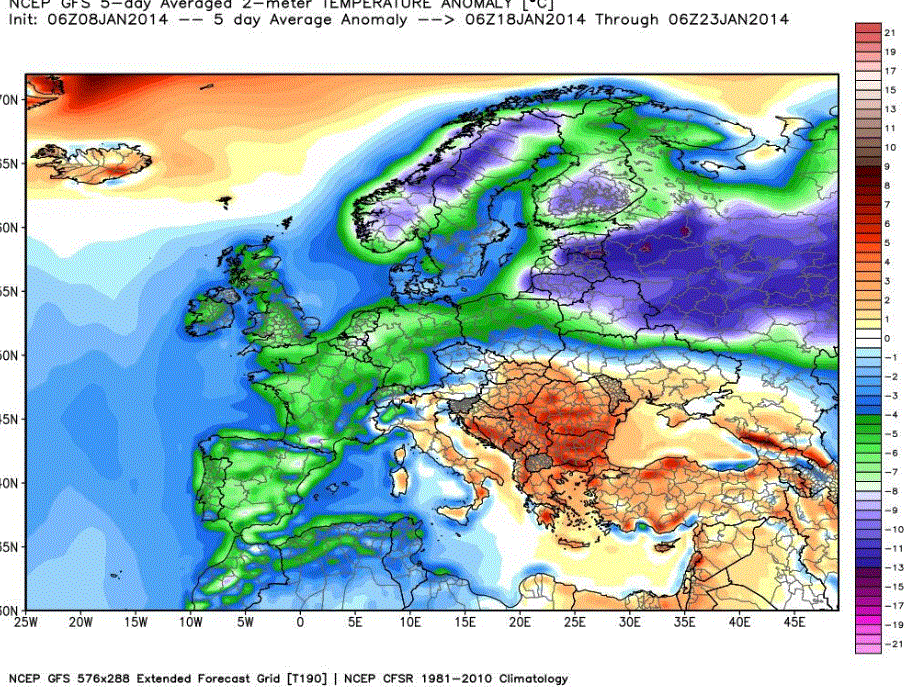Europe and especially Germany have been enjoying an unusual, weeks-long spell of mild weather with temperatures in the double-digit Celsius range. Southerly winds have kept the continent mild for weeks. Warmists have been coming out and saying: Aha! Just as we predicted! And they are even claiming the same about the deadly cold weather gripping North America.
Meteorologist: extremes are natural and nothing new
However, yet another veteran German meteorologist has come out and dumped cold water on the claims that the supposed weather extremes are signs of a warming planet. Meteorologist Udo Baum at wetter.net here tells readers that the extreme cold wave gripping the US and the mild weather in Europe are nothing unusual and are all part of natural weather.
Far greater fluctuations were common in history
Baum writes:
Indeed a look back at the last 2000 years shows that there have been already even far greater fluctuations. Individual winters were so cold that rivers and lakes froze over. But also some winters were so mild that it never snowed in the flatlands and that flowers and fruit trees blossomed two months earlier than normal.
The fluctuations between individual years are much too great to allow us to attribute them directly to long-term climate trends. And this winter is still not over and surprises are completely possible. […]
There are still too many inconsistencies and too many unknowns within the complex and chaotic climate system. Here it’s warmer; there it’s colder. The role of the oceans is still not sufficiently researched, carbon dioxide is not the only problem-gas in the atmosphere, says the team at wetter.net.
Methane plays a considerably more aggressive role. The interactions of water vapor content in the atmosphere play a large role.
Thus we maintain that the USA is not facing an ice age and that winter is not going to disappear in Central Europe in the future. In two or three weeks the weather may be entirely different, never mind next winter.”
Natural factors under-stated – can reverse man-made impacts
On natural climate factors, Baum writes:
The warming trend that is enhanced by man over the last four decades can suddenly switch back because of natural cycles or natural catastrophes and their one-time effects.”
Winter returning to Europe
On another topic, people have been asking me if we’re going to see any winter this year. Unfortunately the spring-like weather is about to end across much of Europe in a couple of days. The weather models are now pretty much unanimous and show a fundamental change in weather patterns in the works.
Donnerwetter here writes:
For the coming weeks almost all computers are showing a weather change to winter. Many centimeters of new snow are expected at temperatures at around -2 Grad C in the central mountains and 0 Grad C in the lowlands. Next week the eastern winds are back. At times frost of up to -10 Grad C are expected at night.”
The cold pole over the high north now has the chance to move closer to Europe and Asia. In addition in the days ahead continental, permanent sub-freezing air is gathering in Siberia and deep into Russia.
Thus the huge cold snap in the USA indirectly could level the way for winter to reach Europe, but likely in a less dramatic manner. Currently signs are mounting that the downward temperature trend will get a boost next week. More and more models are pointing to the possibility a cold air mass extending out to Central Europe from the northeast.”
Here’s the 10-15 day outlook, thanks to Joe Bastardi at Twitter:






Today, on 8th. Jan. 2014, the meteorologist Marcus Beyer at the German Weather Service saw two possibilities to change Europe’s weather conditions toward winter*)
*) Only available in German and the text in italic is only a rough summary from one paragraph; http://www.dwd.de/bvbw/appmanager/bvbw/dwdwwwDesktop?_nfpb=true&_pageLabel=dwdwww_start&_nfls=false
1. At the position of the Low “Christiana” in the Eastern North Atlantic establishes a High Pressure, with a corresponding Low over Eastern Europe, or
2. A High Pressure over Scandinavia and corresponding Low Pressure in the Mediterranean.
Cold air could then transport continental air masses from Russia, because mild air has moved far into the East, thus cold air is far away (Fig. 2).
First the cold over North America needs to disappear. With the withdrawal of cold air from the North Atlantic this area is virtually without energy. In a second step the winter gathers his cold companions across northern and north-eastern Europe. Tool for this purpose is a strong low-pressure (e.g. Christiana, see Fig. 2) moving to the Baltic countries and Russia. This would allow cold air to be sucked from the pole. In a third and final the “weather” pushes Atlantic low pressure areas as far as the southern cyclone track towards the Mediterranean. This can happen by early next week (13-19-Jan.), while a strong high pressure is placed over Scandinavia and the North Sea. This would clear the way for the cold air to flow from north-eastern Europe to Western Europe.
Discussed at: http://www.2007seatraining.de/Archiv/_1412c.html
[…] ”Thus we maintain that the USA is not facing an ice age and that winter is not going to disappear in Central Europe in the future. In two or three weeks the weather may be entirely different, never mind next winter.” (hämtat från Gosselin) […]
Pierre,
It is clear that when Warmists knew that global warming had stopped they latched onto weather events, something they had accused sceptics of doing in the past. They even ignore the IPCC’s own positions of authority when it suits them. The IPCC said warmer winters but Warmists said colder is entirely consistent with their religion.
[…] https://notrickszone.com/2014/01/08/veteran-german-meteorologist-affirms-winter-cold-and-mild-extreme… […]